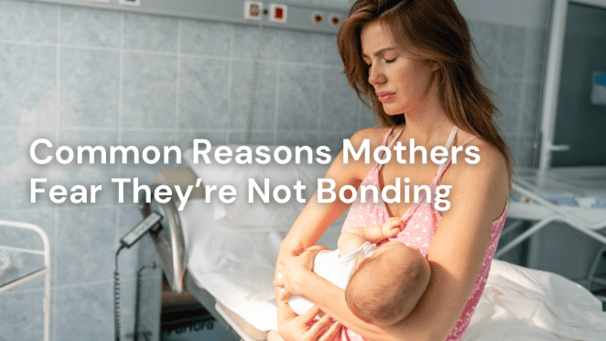The Fear of Not Bonding With Your Baby
7/1/20255 min read


New motherhood is often framed in glowing terms—overwhelming love, instant attachment, and a magical connection that blossoms from the first moment of skin-to-skin contact. But for many women, the reality is far more complex. One of the most painful and rarely discussed experiences is the fear of not bonding with your baby.
This fear can creep in quietly or hit like a wave, especially in the days or weeks after birth. It can look like numbness, doubt, confusion—or even guilt for not feeling what you thought you "should." In some cases, it’s a side effect of exhaustion. In others, it’s a sign of deeper emotional struggles like postpartum depression (PPD) or anxiety.
At Peace Temple, we regularly support mothers who feel ashamed or alarmed by their emotional disconnection from their baby. The truth is, bonding doesn’t always happen instantly—and when it doesn’t, it can stir up enormous self-doubt. But the fear of not bonding doesn’t mean you’re a bad parent. It means you’re human, and you may need support.
What Does Bonding Actually Mean?
Bonding is the emotional connection that develops between a parent and their baby. It’s what helps a mother instinctively respond to her baby’s needs, feel pleasure in their presence, and experience a growing sense of love and protection.
However, bonding is often misrepresented as a single, dramatic event—something that either happens or doesn’t in the first few days postpartum. In reality, bonding is a process, not a moment. It unfolds gradually, with ups and downs, over weeks and months.
Expecting instant love can set unrealistic standards, especially in the presence of hormonal upheaval, physical pain, trauma, or emotional exhaustion.
Common Reasons Mothers Fear They’re Not Bonding
1. Postpartum Depression and Anxiety
When someone is experiencing PPD or anxiety, their emotional bandwidth shrinks. Instead of joy or tenderness, they may feel numb, irritable, or detached. This can delay bonding—not because love is absent, but because the nervous system is overwhelmed.
At Peace Temple, many clients describe this as “being behind a glass wall”—present, but emotionally unreachable.
2. Traumatic Birth Experience
A frightening or traumatic birth can lead to physical shock and emotional dissociation. When the birth doesn’t go as planned, it can interrupt the natural rhythm of bonding and introduce fear or grief into what’s supposed to be a joyful moment.


3. Breastfeeding Struggles or Feeding Challenges
Feeding is often seen as a bonding moment—but when it’s painful, difficult, or medically complicated, it can create frustration or resentment instead. This disconnect often leads mothers to question their abilities or their emotional connection with the baby.
4. Personality or Temperament Mismatch
Some babies are naturally fussier, harder to soothe, or less responsive. This doesn't mean anything is wrong—but it can make bonding harder, especially if the parent expected a peaceful, cuddly new born.
5. Lack of Support and Isolation
New motherhood can be incredibly isolating. When a mother has no time to rest, process, or receive affection herself, it becomes even harder to offer emotional energy to her child.
How the Fear Manifests Emotionally
The fear of not bonding doesn’t just stay in the background—it colours how a mother feels about herself, her baby, and her identity as a parent.
Common thoughts include:
“Why don’t I feel anything?”
“I love my baby, but I don’t like them right now.”
“I’m not meant to be a mother.”
“Everyone else seems so connected—what’s wrong with me?”
“What if this feeling never goes away?”
These thoughts, left unchecked, can spiral into self-loathing, panic, and shame. But feeling disconnected doesn’t make you broken. It makes you in need of care.
The Impact on Parental Identity
One of the most damaging parts of struggling to bond is the identity crisis it creates. Motherhood is supposed to bring fulfillment, right? So why does it feel so lonely? Why do you feel more like a caregiver than a mother?
At Peace Temple, we work closely with mothers navigating this exact emotional terrain. We remind them: identity is not a fixed trait—it’s something that forms and reforms over time. The connection you seek may just need more space, time, and grace to unfold.
How to Cope and Rebuild Connection
You don’t have to wait for “real love” to appear before you begin to build it. Love is not just a feeling—it’s a practice, and every small, imperfect moment counts.
1. Talk About It
Saying out loud that you’re struggling to bond may feel terrifying—but it is also a radical act of courage. Whether it’s a partner, a friend, or a therapist, speaking your truth breaks the isolation and invites support.
At Peace Temple, we provide safe, judgment-free spaces where mothers can explore these feelings without fear of being labelled.
2. Practice Skin-to-Skin and Gentle Contact
Even if you don’t feel connected, physical closeness can help regulate both your and your baby’s nervous systems. Try skin-to-skin time, babywearing, or simply resting together. These acts are non-verbal invitations to bond—and they work even if you feel detached at first.
3. Take Care of Your Own Emotional Needs
You can’t pour from an empty cup. Sleep, nourishment, social connection, and rest are not indulgences—they’re prerequisites for emotional presence. Make space for your own well-being, even if that means stepping away briefly to recharge.
4. Let Go of the Idealized Image
There’s no one way to connect with a baby. Some mothers bond while feeding. Others bond through play, routines, or shared moments months down the line. Let your connection develop in its own time, outside the confines of what social media or culture tells you it should look like.
5. Seek Professional Support
If your feelings of disconnection persist beyond a few weeks, or if they’re accompanied by intrusive thoughts, persistent sadness, or anxiety, reach out for help.
Peace Temple’s maternal mental health specialists are trained to support parents experiencing delayed bonding and can offer tailored therapy to gently rebuild connection and reduce shame.
Final Thoughts: You Are Not Alone
The fear of not bonding with your baby is deeply painful—but it is also incredibly common. And most importantly, it is not permanent.
Bonding is not a one-size-fits-all experience. It’s a slow, sometimes messy, sometimes magical unfolding of trust, care, and emotional availability. And even if it hasn’t happened yet—it still can.
At Peace Temple, we believe that love grows in real time. It doesn't always bloom on day one—but with support, space, and honesty, it does bloom.
You are not a bad mother. You are a mother in progress. And that is more than enough.
